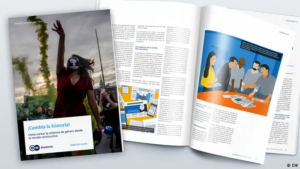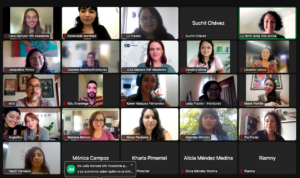Putting aside tabloid journalism and helping to develop alternative narratives from a gender perspective is part of the mission of Cambia la Historia (Change the Story, or Change History), a training program led by the DW Akademie and Salvadoran feminist media outlet Alharaca.
For six weeks, journalists and editors from El Salvador, Mexico, Honduras, Colombia, Argentina and Chile will receive training on violence and the construction of gender stereotypes in Latin America from a critical and intersectional analysis. After this stage, 30 people from the total number of participants will have the opportunity to obtain financing and guidance to carry out a journalistic investigation.
Cambia la Historia is a project that emerged in 2021 as an initiative of the DW Akademie, a Deutsche Welle center for the development of journalism and the media that has funding from the German Ministry of Foreign Affairs.
“Basically we saw that violence against women is omnipresent in Latin America and although the media in the region talk about physical violence, little is said about the recurrent and structural patterns,” Lena Gamper, project coordinator at DW Akademie, told LatAm Journalism Review (LJR).
“We seek to break stereotypes and instead develop alternative narratives. From the beginning we have had this idea of working with solutions journalism or constructive journalism, and in that way providing value,” she added.
The call for the third edition of the program will be open until June 9 and, according to the project leaders, both journalists and editors can apply without gender limitations. Those selected must have a minimum of five years of professional experience and have a first pitch ready for the story they want to tell.
“[Participants] must have an openness to the exchange of knowledge and experiences. Have a real interest in these types of topics and the ability to apply them in their daily coverage and to improve their journalistic practice. The idea is that the knowledge can also be extended to other colleagues,” Laura Aguirre, co-founder of Alharaca, told LJR.
Aguirre explained that Alharaca joined this project in its second edition and they decided to repeat it this year because they believe it is important to make gender violence visible in Latin America and, even more so, to show how the victims of this violence can still find creative, organizational and collective ways. to face challenges.
“Without this meaning, of course, that we are idealizing any of the situations,” Aguirre clarified.
A focus on solutions journalism
Cambiar la Historia is a play on words that includes not only changing the way in which stories of violence have been told in Latin America, but also means the search to change the course of the lives of the victims who open themselves to tell their stories, as Gamper explained.

30 of the total number of participants in Cambia la Historia will have the opportunity to obtain funding and guidance to carry out a journalistic investigation (Photo: DW Akademie).
This is part of the program's constructive or solutions journalism approach. It seeks to do journalism with the intention of showing how people continue to be agents of their lives by finding solutions. It not only talks about the problem but also about the possible solutions that can be replicated.
The impact of this project has already been palpable. In the first edition of the program carried out in 2021, Mexican journalist Dulce Soto from media outlet Corriente Alterna published an investigation to make visible the violence that people face in the judicial system in Mexico.
In the article “Las batallas de Leo contra el sistema penal” (Leo's battles against the penal system), Soto walks through the story of Leo, a trans man who, despite having received parole, was still in prison for not being able to pay for the cuff that was imposed on him as a monitoring device.
Hours after the publication of the article, a Mexican federal court gave a period of three days for the responsible authority to explain why Leo had not been granted the cuff. He was released the next day.
“One of the reasons why we opened this third edition is precisely because of the impacts and engagement we have had within the Central American countries and the good reception among the media ecosystem. That is why this third edition was also expanded to three more countries, now in the Southern Cone,” Aguirre said.
Participants in previous editions have investigated topics that cover the rights of women with disabilities, family abuse, violence against Indigenous peoples, abortion, obstetric violence, among others.
Eric Lemus is a Salvadoran journalist from Revista Espacio who participated in the 2022 edition of Cambia la Historia. His investigation was based on making visible how women who suffer obstetric emergencies in El Salvador end up going from the hospital to prison. They are accused of having had an abortion and charged with aggravated homicide.
“The experience in my year was immensely productive because I not only had journalistic editorial assistance, but I had training support with specialists who taught me how to improve my language when it comes to sensitive topics,” Lemus told LJR. “Without this training, a journalist can re-victimize.”
In his article, Lemus chose the comic format as a narrative element. According to him, he chose that narrative to lower the intensity of the testimonies and the story.
“I wanted to be able to explain such a complex drama using the elements included in the cinematographic technique: the introduction, the middle ending and then the conclusions,” the journalist said.
Lemus emphasized the importance of including topics that make violence against women visible on the public agenda since, according to his perspective, these stories against the female population have a different element that is “the burden of hate,” a violence that reproduces stereotypes, stigmas and gender prejudices.
Opening the conversation within newsrooms

For six weeks, journalists and editors from El Salvador, Mexico, Honduras, Colombia, Argentina and Chile will receive training on violence and the construction of gender stereotypes in Latin America from a critical and intersectional analysis. (Photo: DW Akademie)
The Cambia la Historia team decided in 2024 to add, for the first time, a special space for the training of editors on issues of violence and gender perspective in Latin America.
“We are very interested in these people who make decisions within newsrooms being able to participate in the program. We are aware that it is very difficult to promote changes within the newsrooms if there is no awareness and a desire on the part of these media to do so,” Aguirre said.
The editors will go through the same training process as the journalists participating in the program. The call for applications also closes on June 9.
According to Aguirre, including editors also came from the need to open the conversation about gender violence in other spaces and reduce ignorance and prejudice around the topic.
“We want to have the opportunity to open those conversations with these people who have the possibility of making immediate operational changes within the newsrooms,” Aguirre said. “Talking about a gender perspective, talking about an inclusive perspective, is really including everyone and that means better journalism, more comprehensive, more honest, more transparent journalism.”